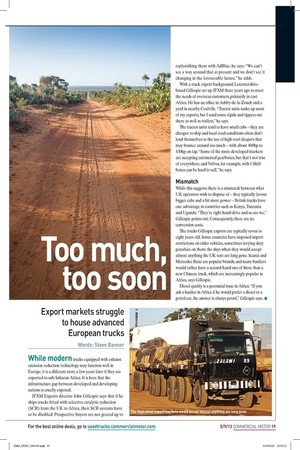Export markets struggle to house advanced European trucks WO1C15: Steve Banner
Page 14

If you've noticed an error in this article please click here to report it so we can fix it.
While modern trucks equipped with exhaust emission reduction technology may function well in Europe, it is a different story a few years later if they are exported to sub-Saharan Africa. It is here that the infrastructure gap between developed and developing nations is cruelly exposed. JFXM Exports director John Gillespie says that if he ships trucks fitted with selective catalytic reduction (SCR) from the UK to Africa, their SCR systems have to be disabled. Prospective buyers are not geared up to
replenishing them with AdBlue, he says. "We can't see a way around that at present and we don't see it changing in the foreseeable future," he adds.
With a truck export background, Leicestershirebased Gillespie set up JFXM three years ago to meet the needs of overseas customers, primarily in east Africa. He has an office in Ashby-de-la-Zouch and a yard in nearby Coalville. "Tractor units make up most of my exports, but I send some rigids and tippers out there as well as trailers," he says.
The tractor units tend to have small cabs — they are cheaper to ship and local road conditions often don't lend themselves to the use of high-roof sleepers that may bounce around too much — with about 400hp to 430hp on tap. "Some of the more developed markets are accepting automated gearboxes, but that's not true of everywhere, and Volvos, for example, with I-Shift boxes can be hard to sell," he says. Mismatch
While this suggests there is a mismatch between what UK operators wish to dispose of — they typically favour bigger cabs and a bit more power — British trucks have one advantage in countries such as Kenya, Tanzania and Uganda. "They're right-hand-drive and so are we," Gillespie points out. Consequently, there are no conversion costs.
The trucks Gillespie exports are typically seven to eight years old. Some countries have imposed import restrictions on older vehicles, sometimes levying duty penalties on them: the days when they would accept almost anything the UK sent are long gone. Scania and Mercedes-Benz are popular brands, and many hauliers would rather have a second-hand one of these than a new Chinese truck, which are increasingly popular in Africa, says Gillespie. Diesel quality is a perennial issue in Africa. "If you ask a haulier in Africa if he would prefer a diesel or a petrol car, the answer is always petrol," Gillespie says. •









































